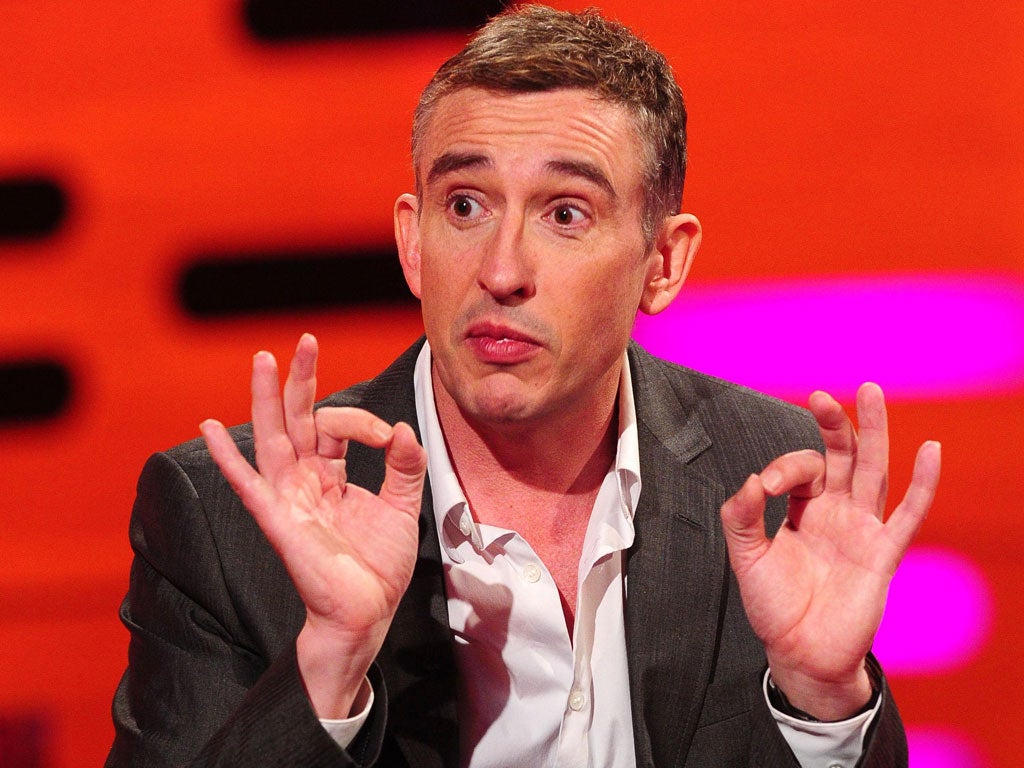Steve Coogan: Mr Angry hasn't finished with the red-tops yet
The phone-hacked comedian is on a crusade to reform the press... Matthew Bell met him

The trouble with interviewing Steve Coogan is that he doesn't want us to know anything about him. What's he really like? What does he get up to in his private life? Most of all, he doesn't want us to know "where he put his penis last night" (his words, not mine). And yet, confusingly, it's because he wants journalists to keep their beaks out of his business that he's talking so energetically to me now, in a taxi from Soho to St Pancras.
On Tuesday, the 46-year-old comedian will address a Hacked Off fringe meeting at the Lib Dem conference. He will be there in his latest role, as a campaigner for press reform. He knows as well as we do that there's nothing worse than an actor with a cause. Especially one who would appear to be pursuing an agenda based on their own experiences at the hands of the red-tops. But it's a sign of how angry he is that he's prepared to endure the brickbats to make hihas point.
Which is? That Britain has a moral duty to sort out its press once and for all. Lord Leveson will present his recommendations to parliament in November, and after that, the way news is gathered and delivered could change a lot. Or not at all. What Coogan wants is for newspapers to aspire to higher standards. "Yes, I am being aspirational," he says. "I know people will say, 'Ooh, who do you think you are, Oliver Cromwell?' But there's an opportunity here for a change of attitude. To draw a line drawn under the past and hope we get a better press: one that is more inclined towards public-interest journalism."
The debate over what constitutes the public interest has been going round in circles. The fact that as many as eight million people delved into the News of the World every Sunday suggests the public was interested in stories with little "public interest" defence. But Coogan, who had his phone hacked, says there is no justification for his private life to be a matter of public consumption, just because he is on telly.
"I'm no more of a celebrity than Lord Leveson," he says. "I happen to have a public profile. Ditto newspaper editors. It's a result of what I do, not an end." Yet without publicity, wouldn't his career suffer? "I want to tell people about my work. I want my work to be judged, not me. I don't want to be photographed going into premieres. I don't go to premieres, unless I'm contractually bound to."
Coogan accepts that the lives of others are interesting. He also admits there are things he has done that he'd rather nobody knew about. And sometimes, he concedes, a story about someone's private life could be in the public interest. "If someone has gone on record, for example, making statements intolerant of gay people, but they are secretly pursuing a gay relationship, you could say that is in the public interest. Or if someone sets themselves up in public life as being a paragon of virtue, who invites judgement on that basis, and they transgress in some way, then that could be in the public interest."
And politicians? "If the politician makes it the issue, then it is. And if he doesn't, it's not." So each case must be judged individually? "It is complex," he agrees. "But it's not unwieldy. Whatever solution that's come up with will be imperfect. But imperfection doesn't mean don't do it."
The underlying problem is: who decides what stories are in the public interest? At the moment, that responsibility lies with editors. Coogan's solution is that it lies with an independent panel made up of impartial do-gooders. So, every time a journalist has a story, and they are unsure of its "public interest" defence, they would present it to the panel. Their verdict wouldn't stop the newspaper from running it. But, should future repercussions emerge, their advice could be taken into account.
The squeals of newspaper editors crying for a free press are a smokescreen, he says, distracting from the commercial reality that titillation sells newspapers. So, is he telling people who buy scandal sheets that they shouldn't? "This attitude of 'oh, there's nothing wrong with it', this rather dismissive, postmodern fatalism, it's not sustainable any more."
So he's angry with red-tops; he's angry with their readers; he's angry with the Daily Mail, which he calls "insidious", and says its website is "onanistic". "It doesn't matter that lots of people read it. Lots of people used to buy Barry Manilow records." He is even angry with some serious journalists on liberal broadsheets, who were reluctant to acknowledge the phone-hacking scandal until they had no choice. "Simon Jenkins slowly started to adapt his position. Peter Preston slowly started to say, 'Well, they're having a go at the Murdochs, so I suppose it's all right.' It's pathetic the way they have shifted uncomfortably in their seats, not sure what to do."
Despite his campaign, Coogan's not hopeful about lasting change. "They're like children, behaving themselves while they wait for the grown-ups to go away." With that, he catches a train to Derby, where he's filming a low-budget film for a friend. He has just come from a screening of a new movie about porn baron Paul Raymond, whom he played. Next month, he begins shooting a film he's written about babies being sold in Ireland. Next year, he starts work on Alan Partridge: the movie. All this he will be happy to talk about in due course. Just don't ask where he put his penis last night.
Join our commenting forum
Join thought-provoking conversations, follow other Independent readers and see their replies
Comments